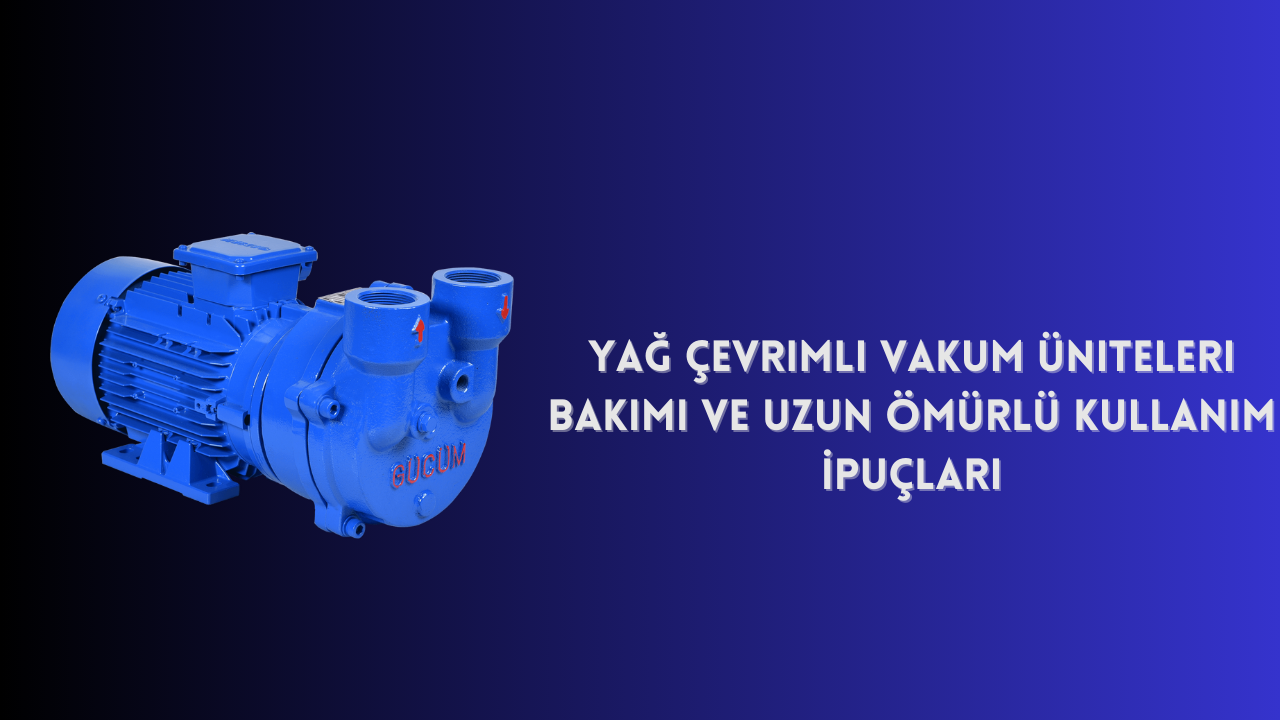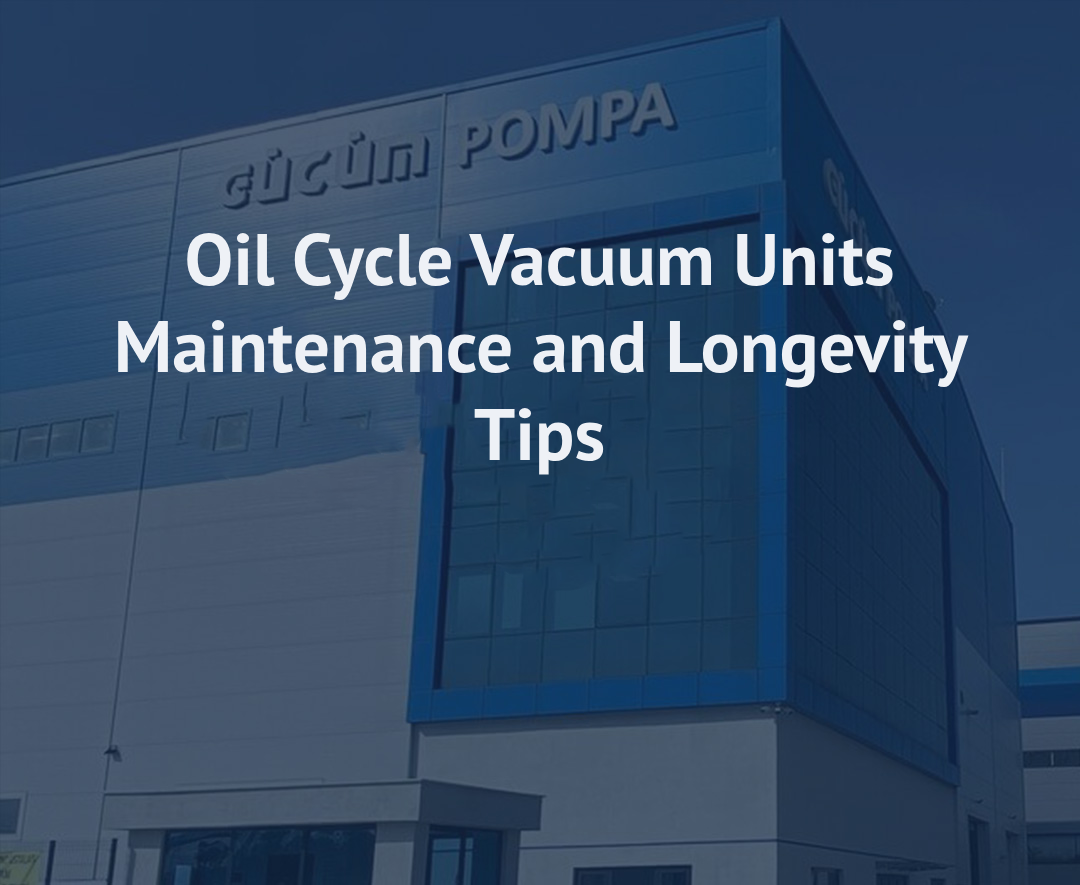Oil Cycle Vacuum Units Maintenance and Longevity Tips
Table of Contents
-
What Are Oil-Sealed Vacuum Units?
-
The Importance of Maintaining Oil-Sealed Vacuum Units
-
Regular Filter Cleaning
-
Checking Oil Level and Quality
-
Cooling System Maintenance
-
Oil and Filter Replacement
-
Leakage Checks
-
Motor and Electrical System Inspection
-
Regular Performance Testing of the Vacuum Unit
Oil-Sealed Vacuum Unit Maintenance and Tips for Long-Term Use
Oil-sealed vacuum units play a critical role in various industrial fields. These units typically operate in environments requiring high efficiency and durability. However, like all industrial equipment, long-term use and efficient operation require regular maintenance. In this article, we will discuss the maintenance of oil-sealed vacuum units and key tips for ensuring their long-term use.
What Are Oil-Sealed Vacuum Units?
Oil-sealed vacuum units are particularly used in industrial applications requiring high vacuum levels. These systems use oil to create a vacuum, evacuating air and gases in various processes to create low-pressure environments. Oil in these units serves both to provide vacuum and to assist in cooling the motor. This results in a system that operates with high efficiency. However, regular maintenance is necessary for these units to function efficiently and remain durable over time.
The Importance of Maintaining Oil-Sealed Vacuum Units
Oil-sealed vacuum units require proper operation, high performance, and long-term use, making maintenance highly important. Lack of maintenance can reduce the unit’s efficiency and lead to malfunctions. Regular maintenance ensures the equipment’s longevity, reduces energy consumption, and enhances efficiency. Additionally, maintaining vacuum units helps detect potential issues in advance during operation.
Regular Filter Cleaning
Regular filter cleaning is a critical step for the system’s efficient operation. Filters prevent foreign particles from entering the vacuum unit’s interior and keep the oil from becoming contaminated. Over time, however, these filters become dirty and clogged, negatively affecting the vacuum unit’s efficiency. Therefore, filters must be regularly cleaned or replaced as needed. Filter cleaning allows the unit to perform better while consuming less energy.
The Role of Oil Level and Quality
Oil performs several key functions in the operation of a vacuum unit. It is essential for vacuum creation, maintaining the system’s temperature balance, and protecting the motor. Checking the oil level and quality regularly ensures both efficient operation and long-term durability of the system. When oil levels are low, the vacuum unit’s operation can become difficult. A decrease in oil can prevent adequate motor cooling, leading to overheating and potential motor failures. Additionally, low oil levels reduce vacuum creation capacity, directly impacting the system’s efficiency. Oil quality, on the other hand, is affected by contaminants and particles within the oil. Dirty or poor-quality oil negatively impacts the vacuum unit’s efficiency and shortens its lifespan. Water, acidic substances, and foreign particles in the oil can cause corrosive effects within the system. Such contaminants alter the oil’s viscosity, reducing its cooling properties and vacuum creation capacity.
The Importance of Oil Level Checks
Regularly checking the oil level is a vital step for the proper functioning of the vacuum unit. Low oil levels directly affect motor efficiency and can cause the unit to overheat. Below are some key points explaining why checking the oil level is important:
Motor Cooling: Oil serves to cool the vacuum unit’s motor. When the motor overheats, efficiency drops, and its lifespan shortens. Low oil levels prevent sufficient cooling of the motor.
Efficiency: Low oil levels directly impact the vacuum unit’s performance. As oil levels decrease, vacuum capacity diminishes, leading to disruptions in production processes.
Wear and Tear: When oil levels are low, the motor’s metal parts begin to rub against each other, causing wear. This wear shortens the lifespan of both the motor and other components.
Oil levels should be regularly checked and oil added as needed. Maintaining high oil levels helps the system operate more efficiently and reduces the risk of overheating.

The Importance of Oil Quality Control
Oil quality also plays a significant role in the system’s efficiency and longevity. Oil can become contaminated over time due to pollutants. Controlling oil quality prevents dirty or acidic oil from entering the system. Below are some factors highlighting the importance of oil quality control:
Oil Contamination: Oil becomes dirty as it heats up during motor operation over time. Contaminated oil hinders the system’s efficient operation. Additionally, dirty oil can damage the motor’s internal components. Contaminated oil must be filtered and replaced as necessary.
Viscosity Changes: Oil quality affects its viscosity. Over time, oil may lose its viscosity, preventing it from performing its cooling and vacuum creation functions. Regularly checking the oil’s viscosity enhances system efficiency.
Water and Acidic Substances: Water and acidic substances in the oil can create corrosive effects. These substances can weaken the system’s metal parts and cause erosion, leading to serious malfunctions. Oil quality should be regularly checked, and if water or acidic substances are detected, the oil should be replaced.
Contaminants and Particles: Contaminants in the oil prevent the vacuum unit from operating properly. Such particles compromise the oil’s cleanliness and can damage the system. Particles in the oil should be cleaned using filtration systems.
Tips for Regularly Checking Oil Level and Quality
Checking oil level and quality is one of the most important maintenance activities for the efficient operation of oil-sealed vacuum units. Here are some tips to consider during this process:
Regular Measurement and Inspection: Oil level and quality should be checked regularly at set intervals. Immediate action should be taken if the oil level drops. Oil quality should be measured using test kits or laboratory analysis.
Oil Change Intervals: Oil becomes dirty and loses quality over time. Therefore, it must be replaced after a certain period. This duration may vary depending on the vacuum unit’s usage intensity and operating conditions.
Filter Cleaning and Replacement: Filters keep the oil clean. Regularly cleaning or replacing the oil filter helps maintain oil quality.
Oil Type and Quality: The type and quality of oil used directly affect the unit’s performance. Using low-quality oil can cause serious system issues. High-quality and suitable oil is essential for a long-lasting and efficient system.
Cooling System Maintenance
Cooling system is critical in preventing the motor from overheating. The vacuum unit’s cooling system ensures both oil cooling and keeps the unit operating at ideal temperatures. Blockages or deficiencies in the cooling system can cause the unit to overheat, leading to equipment failures. Therefore, the cooling system must be regularly checked and maintained.
Oil and Filter Replacement
Oil and filter replacement should be performed periodically for the vacuum unit to operate efficiently. Oil nourishes all the unit’s mechanisms and cools the motor. Over time, oil becomes dirty and loses its functionality. Additionally, foreign substances in the oil negatively affect the unit’s efficiency. Filters also become dirty over time, reducing the vacuum unit’s performance. Performing oil and filter replacements at regular intervals ensures the system operates efficiently for a long time.
Leakage Checks
The leak-tightness of vacuum units is extremely important for efficient operation. In oil-sealed vacuum units, air and gas leaks can significantly reduce system efficiency. Therefore, the sealing gaskets must be regularly checked. If leaks are detected, the gaskets should be replaced immediately. Additionally, proper installation and assembly of the unit are necessary to prevent any leakage issues.
Motor and Electrical System Inspection
Motor and electrical systems ensure the proper functioning of the entire equipment. The motor directly affects the vacuum unit’s performance, so it must be regularly inspected. Overheating or electrical issues in the motor can reduce the vacuum unit’s efficiency. Ensure that electrical connections are sound and the motor is free of any issues.
Regular Performance Testing of the Vacuum Unit
Performance tests are important for checking whether the system is functioning properly. These tests evaluate the unit’s vacuum capacity as well as the efficiency of the motor and other components. Regular performance tests help detect potential issues early, preventing costly repairs. They also improve system efficiency, contributing to energy savings. Oil-sealed vacuum units require regular maintenance to operate efficiently and durably over the long term. The tips mentioned above will simplify the maintenance of these units and enhance their performance. Regular maintenance not only extends equipment lifespan but also reduces energy consumption, lowering operational costs.


